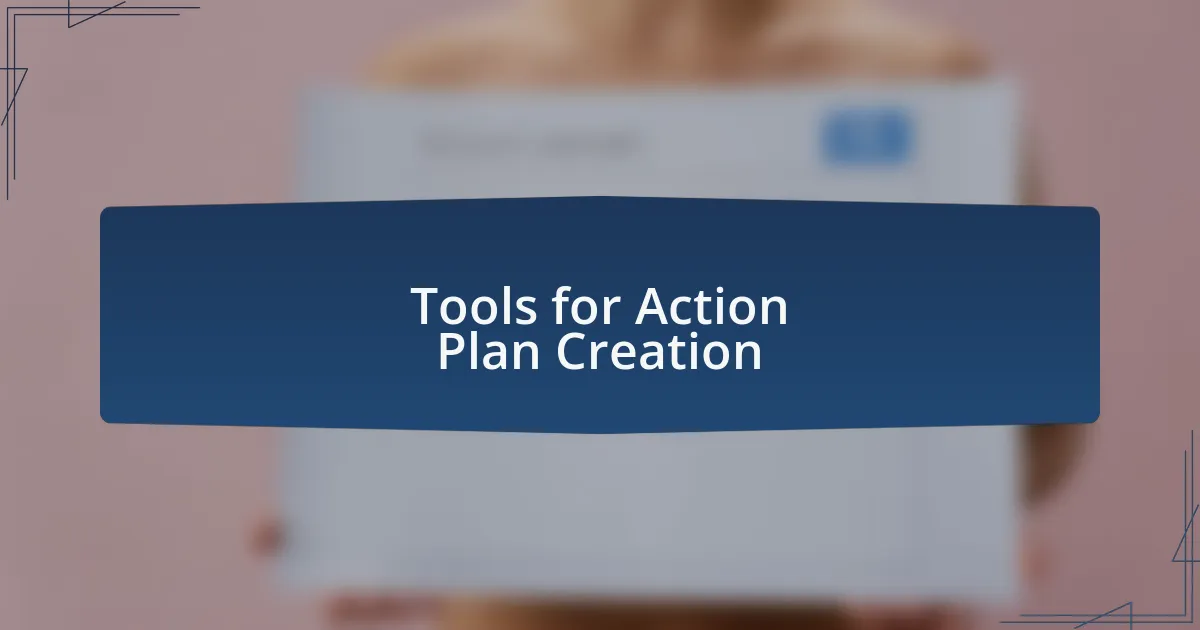Key takeaways:
- An action plan serves as a flexible roadmap that breaks down larger goals into manageable tasks, providing clarity and motivation.
- Accountability and sharing your action plan with others enhances collaboration, making the journey more engaging and less lonely.
- Regularly reviewing and adjusting your action plan can lead to significant improvements, allowing for adaptation to changing circumstances.
- Documenting the implementation process helps in reflecting on experiences and can guide future projects, benefiting both oneself and others.

Understanding Action Plans
When I first encountered action plans, I found myself wondering how such simple tools could lead to significant outcomes. An action plan is essentially a strategic roadmap that breaks down larger goals into manageable steps. It’s like having a clear recipe to follow, which can alleviate the anxiety of tackling overwhelming tasks.
As I started implementing action plans in my projects, I discovered the power of structure in guiding my progress. Each step, no matter how small, felt like a victory that kept my motivation alive. Have you ever felt the thrill of checking off tasks? That’s what an action plan offers—a tangible way to visualize your achievements while maintaining clarity on what’s next.
I believe that understanding an action plan also hinges on recognizing its adaptability. It’s not a rigid formula; rather, it’s a living document that can evolve with changing circumstances. This flexibility hit home for me during a particularly challenging project, where I had to frequently adjust my plan. It reinforced a vital lesson: as long as I stayed committed to the process, I could navigate obstacles and still move forward.

Importance of Action Plans
When I reflect on the importance of action plans, I can’t help but recall a time when I faced a daunting project deadline. I realized that without a structured approach, I would likely feel overwhelmed and scatter my efforts. Action plans serve as a crucial foundation, providing clarity and direction in chaotic moments. Have you ever felt paralyzed by choices? An action plan can cut through that confusion, giving every task a purpose.
The emotional weight of having a clear action plan cannot be overstated. I remember the sense of relief washing over me when I mapped out my steps for a complex initiative. It transformed my anxiety into excitement, as I could finally see a pathway to success. This emotional shift highlights how action plans can foster a positive mindset, turning what once felt like a burden into an achievable challenge.
Moreover, action plans are powerful tools for accountability. Sharing my action plan with my team not only strengthened our collaboration but also ensured that we were collectively invested in the outcomes. Have you experienced the accountability that comes from openly communicating your goals? It creates a shared responsibility, making progress a joint venture that’s more motivating than going solo.

Tools for Action Plan Creation
When it comes to creating an action plan, I often turn to digital tools that streamline the process. For instance, I find project management software like Trello or Asana incredibly helpful. They allow me to break tasks into manageable chunks and assign deadlines, which makes a daunting project feel far less intimidating. Have you ever used a tool that transformed your approach to planning?
Another favorite of mine is mind mapping software. I vividly remember the first time I utilized MindMeister for brainstorming a new marketing campaign. It helped me visually map out my ideas, revealing relationships I hadn’t previously considered. This method sparked my creativity and opened new pathways, allowing me to connect dots in ways that a simple list couldn’t.
Additionally, keeping a dedicated journal or using note-taking apps like Evernote can be powerful allies in action plan creation. In my experience, jotting down thoughts and reflections not only clarifies my goals but also evokes a sense of commitment. Can you recall a moment when writing helped crystallize your intentions? It’s a rewarding practice that solidifies my dedication to my action plan.

Personalizing Your Action Plan
When I set out to personalize my action plan, I often reflect on my priorities and values. It’s fascinating how aligning tasks with what truly matters to me can enhance my motivation. Have you ever noticed how a project becomes invigorating when it resonates with your core beliefs? That’s the feeling I strive for each time I craft a new plan.
A pivotal moment in my action planning came when I created a visual representation of my goals. Using colored sticky notes, I mapped out not just tasks but also why each one was significant to me. Seeing everything laid out visually gave me a sense of ownership over my journey. It’s amazing how such a simple visual tool can transform the mundane into something deeply personal and inspiring.
I also encourage adding aspects of accountability to your plan. For me, sharing my goals with a close friend or mentor shifted my approach dramatically. Their insights mattered, and having someone to check in with made me feel more committed. Have you tried enlisting support from others? The encouragement I received helped me stay on track, making the journey feel less lonely and more collaborative.

Reviewing Your Action Plan
Reviewing your action plan is an essential step that I never overlook. I often revisit my goals to assess what’s working and what’s not. It’s like stepping back from a painting to see the full picture; sometimes, the details that seemed perfect up close might not translate well from a distance. Have you ever had that revelation where a minor adjustment leads to a significant positive change?
I remember a time when I re-evaluated my plan midway through a project. I was so wrapped up in execution that I neglected to see the shifting priorities around me. After a thorough review, I scrapped several tasks that no longer aligned with my objectives. The relief that washed over me was exhilarating. Recognizing that it’s okay to pivot is crucial, don’t you think? It can open up new opportunities that you hadn’t anticipated.
During my latest review, I started asking myself targeted questions. What challenges have I faced? How well did I stick to the timelines I set? Reflecting on these can be both enlightening and empowering. I even jot down my thoughts in a dedicated notebook; there’s something cathartic about capturing those reflections. It’s like giving voice to my aspirations while pinpointing the obstacles I’ve overcome.

Implementing Your Action Plan
Executing an action plan can sometimes feel daunting, but I’ve learned to break it down into manageable tasks. For instance, when I was launching a new feature on my website, I set weekly targets to keep myself accountable. Each completed task felt like a mini victory, fueling my motivation and making the process far more enjoyable. Have you noticed how small wins can significantly boost your confidence?
During one of my implementations, I hit a snag that tested my patience. A crucial plugin I relied on failed to integrate smoothly, and my initial reaction was frustration. Instead of letting it derail my progress, I took a step back and explored alternative solutions. This not only resolved the issue but also taught me to be adaptable—a skill that has been invaluable in my ongoing projects. Isn’t it interesting how obstacles can sometimes lead us to better paths?
I find that documenting the implementation process is as important as the plan itself. I’ve kept a digital diary where I track my decisions and their outcomes. This has created a valuable resource for future projects and allows me to reflect on my journey in a meaningful way. Have you ever thought about how your experiences could guide someone else in their own endeavors? Capturing those insights not only helps me but could also inspire others to navigate their challenges more effectively.